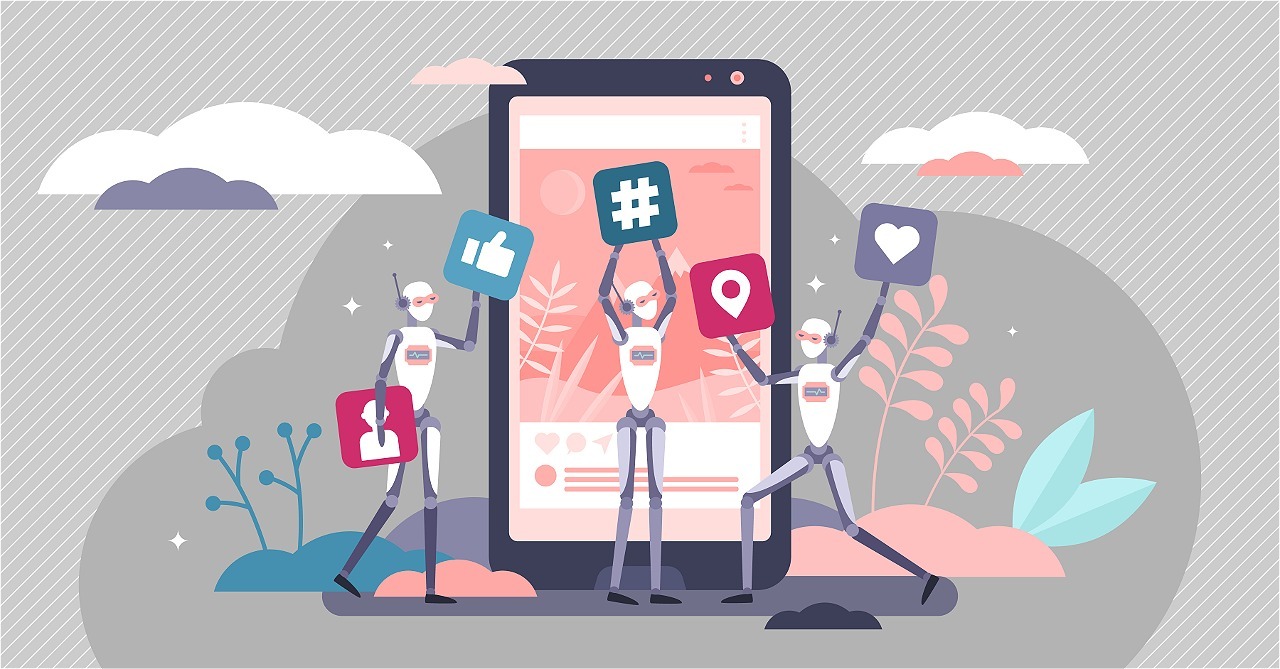“Like anything that can be used as an aiding tool, social media algorithms can also be used as a weapon,” said Dr. Mai Mahmoud, a professor of digital marketing and head of the Digital Marketing Department at Egyptian MTI University.
More targeted than ever with the help of AI in a technology-driven era, social media algorithms can have a deeper influence on users, shaping their digital experiences and molding their perceptions of reality. “AI now allows brands to extract insights from consumer data and automate various processes to better leverage social media platforms and achieve improved marketing return on investment (ROI),” says Spain-based AI Interactive Agency ‘The Keen Folks’.
With algorithms being so powerful and accurate, it’s important to understand their impact and the necessity of being a conscious consumer when exposed to them, in order to remain in control of your own behaviors.
Understanding how algorithms work
Social media algorithms are defined as a “set of rules and signals that automatically rank content on a social platform based on how likely each individual social media user is to like it and interact with it,” according to Canadian social media management platform, Hoot Suite.
Every time a new TikTok video or Facebook post goes live, it becomes part of the vast sea of online content. Algorithms act as curators, sifting through and linking users to their favored content. This serves to avoid inundating users with an infinite stream of content and speeds up their discovery of what they enjoy. They analyze our interactions—likes, shares, comments—to discern our preferences. Using this data, they craft personalized content catered to our interests, attempting to keep us engaged and scrolling.
But this could raise questions about the intentions of the creators of those algorithms.
A double-edged sword
The personalized content that comes from algorithms helps foster an enhanced user experience, making users’ online interactions more relevant and engaging.
“Social media algorithms, when ethically guided, can enhance user experiences, connecting individuals with content that truly resonates with their interests,” said Mahmoud.
Yet, this curated content comes at a cost. Algorithms create echo chambers, reinforcing pre-existing beliefs and isolating users from diverse viewpoints.
“Algorithms are usually selecting information that boosts user engagement in order to increase advertising revenue. This means algorithms amplify the very information humans are biased to learn from, and they can oversaturate social media feeds with what the researchers call Prestigious, Ingroup, Moral, and Emotional (PRIME) information, regardless of the content’s accuracy or representativeness of a group’s opinions. As a result, extreme political content or controversial topics are more likely to be amplified, and if users are not exposed to outside opinions, they might find themselves with a false understanding of the majority opinion of different groups,” Neuroscience News reported.
Additionally, algorithms prioritize sensationalized content, often fueling the spread of misinformation and disinformation.
Furthermore, their fixation on engagement can lead to addictive behaviors and mental health concerns. Stanford University says in its literature on the connection between social media and mental health, “One result of trapping users into endless scrolling loops is that it can lead to social comparison. When presented with the curated feeds of other people, we are vulnerable to “frequent and extreme upward social comparison,” which can lead to a number of negative side-effects such as erosion of self-esteem, depressed mood, and decreased life satisfaction.”
Moreover, this perpetual exposure to customized content fosters an insatiable craving for validation, prompting anxiety, and possibly distorting an individual’s sense of reality.
That said, is it safe to say that algorithms are made with the purpose of manipulating our opinions and preferences?
Manipulative algorithms and media literacy
Within online spheres, malicious individuals exploit algorithms to perpetrate harmful deeds that adversely impact social media communities. Moreover, the allure of personalized content often eclipses the ethical implications entwined with algorithmic design.
“In the college students for whom I provide psychiatric treatment, I see students benefiting when they reduce excessive social media use,” said Dr. Marcia Morris, associate professor in the Department of Psychiatry and associate program director for University of Florida Student Health Psychiatry and author of The Campus Cure: A Parent’s Guide to Mental Health and Wellness for College Students. “One student lost access to their phone for a few days and noticed a reduction in their symptoms of depression and anxiety. They spoke with friends and did hobbies rather than scroll through their phone in the evenings,” she adds.
However, the responsibility doesn’t solely rest on the shoulders of the creators of those social media platforms; it’s a collective obligation for individuals and society at large.
Understanding how algorithms work can help users critically assess the content presented to them. This is where ‘media literacy’ comes in handy.
“The emerging trend of ‘Media Literacy’ or ‘Advertising Literacy’ is pivotal in guiding users to discern content’s impact on their beliefs, mental health, and viewpoints. This is especially true for young people,” Mahmoud said. She called on supporting this move by giving more attention to organizations that nurture media literacy for healthier media consumption and better management of its influence, such as MDLAB in Lebanon.
Paving the way to a healthy social media experience
Balancing this digital seesaw requires reviewing algorithmic design and how it’s made. Responsible algorithms should emphasize accuracy and diversity, all while fostering critical thinking, presenting a spectrum of viewpoints without fueling polarization.
Furthermore, a collective call to action beckons. For their part, individuals must consciously diversify their online interactions. “It is our homework to navigate this landscape consciously knowing what we know about algorithms,” Mahmoud asserts. She adds, “Understanding how to navigate social media algorithms gives us the power to tailor our own online interactions positively. When used mindfully, these tools become a gateway to inspiration, learning, and building a network that enhances our lives.”
Social media algorithms, the invisible architects of our digital realities, wield immense power. But without using this power responsibly, an informed, connected, and empathetic digital society can only be a dream.









